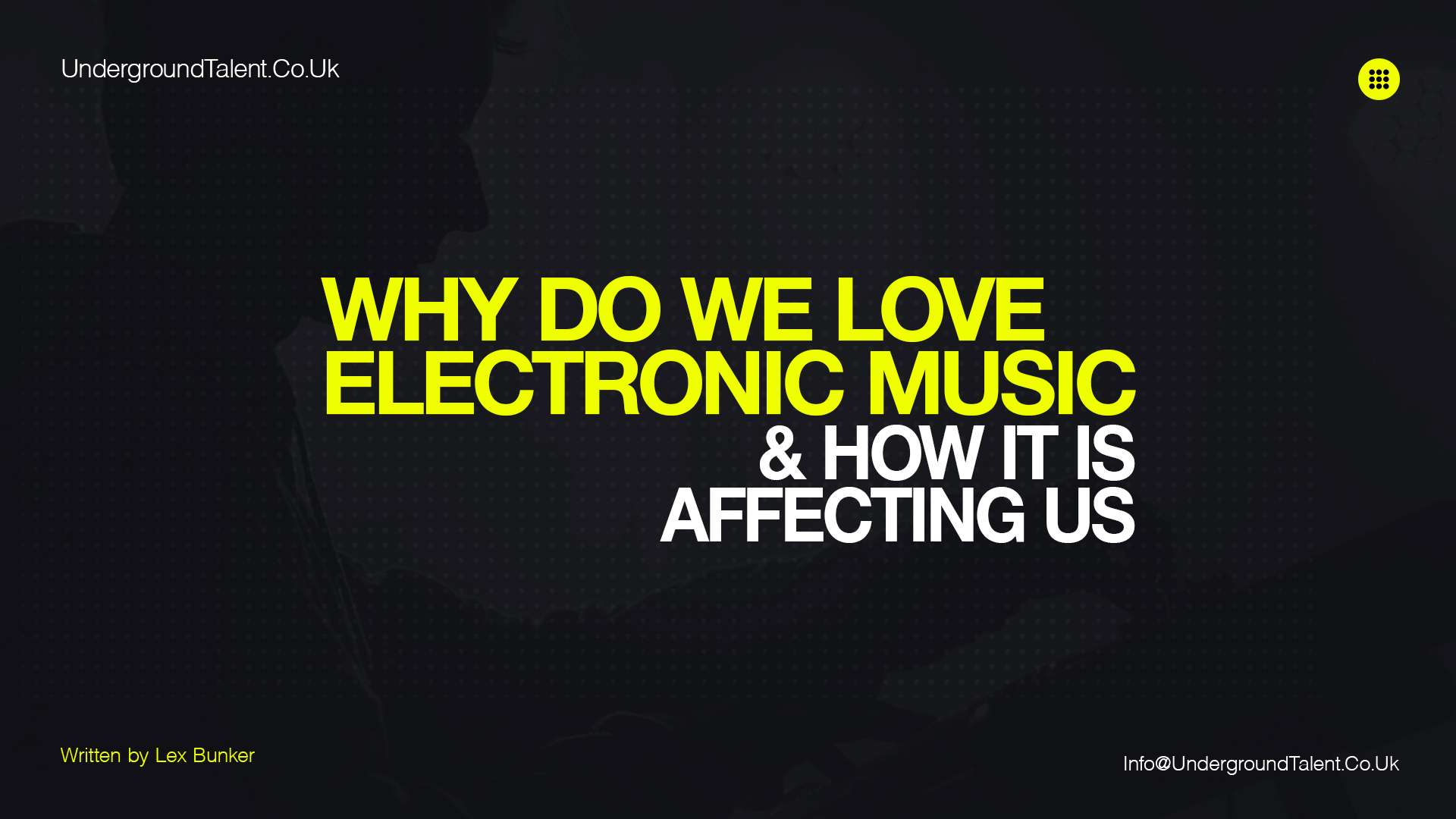Why Do We Love Electronic Music & How It is Affecting Us? | Unlocking the Secrets.
Electronic music has been a staple in the music industry for decades, and its popularity shows no signs of slowing down. But what is it about electronic music that makes it so appealing to so many people?
The genre has grown in popularity over the past few decades and has become a staple in the music industry. It’s a genre that encompasses a wide range of sub-genres, such as techno, house, ambient and downtempo, making it appealing to a diverse range of listeners. Electronic music is known for its unique sound, complex rhythms, and textures, providing an immersive and transcendent listening experience.
 We will delve deeper into the reasons why people love electronic music, and how it affects the brain. We will explore the different sub-genres of electronic music, the emotional responses it evokes, and the scientific explanation behind the brain’s reaction to electronic music. We will also explore the role of electronic music in social experiences and how it can foster feelings of social connectedness and euphoria. Overall, this article aims to provide a comprehensive understanding of electronic music and its appeal to a wide range of listeners.
We will delve deeper into the reasons why people love electronic music, and how it affects the brain. We will explore the different sub-genres of electronic music, the emotional responses it evokes, and the scientific explanation behind the brain’s reaction to electronic music. We will also explore the role of electronic music in social experiences and how it can foster feelings of social connectedness and euphoria. Overall, this article aims to provide a comprehensive understanding of electronic music and its appeal to a wide range of listeners.
Before diving deeper into this article, allow me to give you a short answer on why we love it.
Why Do We Love Electronic Music & How It is Affecting Our Body?
People love electronic music for its diverse range of sub-genres and unique sound. It can evoke emotional responses and improve mental and physical well-being. Studies have found it increases pleasure-associated neurotransmitters and hormones associated with stress and arousal, leading to increased heart rate and energy levels. Electronic music is also often associated with social experiences, fostering feelings of community and euphoria.
Read Also: How to Promote Electronic Music | 10 Ways For Beginners
Wide Range of Sub-genres
The wide range of subgenres in electronic music allows listeners to explore and discover new sounds and styles. For example, techno is known for its fast-paced and repetitive beats, often featuring robotic or mechanical sounds, and is often associated with the club and rave scene. House, on the other hand, is characterized by its deep basslines, soulful vocals, and catchy melodies, and is often associated with the LGBTQ+ community and its origins in Chicago. Ambient electronic music, on the other hand, is characterized by its focus on soundscapes and texture, often featuring minimalistic beats and a slower tempo, providing perfect background music for meditation or relaxation. Downtempo electronic music is also characterized by its slow tempo and dreamy soundscapes, often incorporating elements of jazz, funk, and world music.
This diversity in electronic music allows listeners to explore and discover new sounds, styles, and cultures, and to find music that aligns with their tastes and preferences. Additionally, electronic music often uses complex rhythms, textures, and sounds that are not typically found in other forms of music, providing a unique listening experience. This can be particularly appealing to listeners looking for something new and fresh in the music scene.
Examples of electronic music subgenres are Ambient, Industrial, Breakbeat, Drum and Bass, Acid House, Acid Techno, Electroclash, IDM, Trip hop, Electro House, Techno, Dub Techno, Tech House, Deep House, Minimal Techno, Progressive House, Trance, and the list goes on.
Furthermore, Electronic Music has a strong connection with technology, it allows musicians to create sounds that are not possible with traditional instruments, and also allows for greater flexibility in the production and distribution of music. This has led to a proliferation of independent and underground electronic music scenes around the world, providing a platform for new and emerging artists to showcase their work.
The wide range of subgenres in electronic music allows for a diverse listening experience and the ability to explore and discover new sounds, styles, and cultures. Additionally, electronic music often uses complex rhythms, textures, and sounds that are not typically found in other forms of music, providing a unique listening experience. The connection with technology also allows for greater flexibility in the production and distribution of music and the proliferation of independent and underground electronic music scenes.
Read Also: How To Promote Electronic Music on YouTube?
Why Do We Love Electronic Music & How It Can Evoke Emotional Responses
Electronic music can evoke a wide range of emotional responses, from feelings of euphoria and energy to feelings of transcendence and immersion. This is partly due to the repetitive beats and patterns that are often found in electronic music. Repetitive beats can have a hypnotic effect, leading to feelings of euphoria and energy. This can be particularly appealing to listeners looking for a release from the stresses of daily life, and a way to let loose and have fun.
Immersion & Transcendence
Many tracks are also designed to produce a sense of immersion and transcendence. This can be achieved through the use of soundscapes, textures, and layering of sounds that create an immersive listening experience. This can be particularly appealing to listeners looking to escape their daily lives and experience something new and different.
Strong connection with dancing.
Electronic music has a strong connection with dancing, and it’s often played in clubs and festivals, which can be incredibly bonding, and the shared experience of listening to music together can lead to feelings of social connectedness and euphoria. This can be particularly appealing to listeners looking for a sense of community and belonging. It has been used for therapeutic purposes, such as meditation, and yoga, and even for the treatment of mental disorders. The repetitive beats and sounds can help to focus the mind and to provide a sense of relaxation and release from stress. This can be particularly appealing to listeners looking for a way to improve their mental and emotional well-being.
Emotional Responses
Electronic music can evoke a wide range of emotional responses, from feelings of euphoria and energy to feelings of transcendence and immersion. This is partly due to the repetitive beats and patterns that are often found in electronic music. Many electronic music tracks are also designed to produce a sense of immersion and transcendence.
Additionally, electronic music has a strong connection with dancing and social experiences, and it’s often used for therapeutic purposes. All of these factors contribute to the appeal of electronic music and its ability to evoke emotional responses.
Read Also: DJ’s Guide to Local Gigging by Emma Yasumi
Why Do We Love Electronic Music & How It Affects the Brain
Electronic music can also increase the release of cortisol, a hormone associated with stress and arousal. This increase in cortisol can lead to increased heart rate, blood pressure, and energy levels, which can be beneficial for physical and mental well-being. This can be particularly appealing to listeners looking for a way to improve their physical and mental well-being.
Electronic music can change brain waves, putting the listener in a state of heightened focus, creativity, and emotional balance. Studies have shown that listening to electronic music can increase alpha and theta brain waves, which are associated with relaxation and creativity. This can be particularly appealing to listeners looking for a way to improve their focus and creativity.
The International Journal of Behavioral Medicine Study
For example, a study published in the International Journal of Behavioral Medicine found that listening to electronic music before performing a task can improve task performance and increase feelings of pleasure and arousal. Another study published in the Journal of Positive Psychology found that listening to electronic music can lead to increased feelings of joy, energy, and peace of mind.
Electronic music can have a profound effect on our emotional and physiological states. Research has found that listening to electronic music can increase the release of the neurotransmitter dopamine, which is associated with feelings of pleasure and reward, and also increase the release of cortisol, a hormone associated with stress and arousal, which can lead to increased heart rate, blood pressure, and energy levels. Additionally, electronic music can change brain waves, putting the listener in a state of heightened focus, creativity, and emotional balance. All of these factors contribute to the appeal of electronic music and its ability to affect the brain in a positive way.
Don’t Miss: Fossil Archive aka Roberto / R.M.K. @ Special Guest Interview
It Increases Your Heart Rate
The fast tempo of electronic music can have a direct effect on heart rate and blood flow. Studies have found that listening to music with a fast tempo can lead to an increase in heart rate and blood flow, which can have a number of benefits for physical and mental well-being. For example, an increase in heart rate and blood flow can lead to improved cardiovascular health, increased oxygenation of the brain, and improved overall fitness. Additionally, the increased heart rate and blood flow can also lead to an increase in endorphins, which are chemicals in the brain that are associated with feelings of pleasure and euphoria.
This increase in heart rate and blood flow is also beneficial for mental well-being as it can improve focus and concentration, leading to better performance in tasks that require mental effort. Furthermore, it can also help to reduce stress and anxiety and increase feelings of energy and vitality.
Moreover, electronic music has the ability to change brain waves, putting the listener in a state of heightened focus, creativity, and emotional balance. Studies have found that listening to electronic music can increase alpha and theta brain waves, which are associated with relaxation and creativity. Additionally, it can also increase beta brain waves, which are associated with focus and attention. This can be beneficial for those who need to focus on a task or want to improve their creativity and emotional balance.
Electronic Music Connects People
Electronic music is often associated with social experiences, such as dancing or attending festivals and concerts. These experiences can provide a sense of community and belong for listeners. Dancing to electronic music is a common way of expressing oneself, and it can be a great way to connect with others and feel part of a group. The shared experience of dancing and listening to music together can lead to feelings of social connectedness and euphoria. This can be particularly appealing to listeners looking for a sense of community and belonging.
Attending electronic music festivals and concerts is another way to experience electronic music in a social setting. These events are often designed to be immersive and to provide an experience that is greater than just listening to music. They feature multiple stages, lights and visual effects, and an overall atmosphere that creates a sense of unity and community among the attendees. The shared experience of attending these events can lead to feelings of social connectedness and euphoria, and it can be particularly appealing to listeners looking for a sense of community and belonging.
The genre has a strong connection with technology. Platforms such as Soundcloud, Bandcamp, and YouTube, have made it possible for musicians to share their music and for fans to discover new music and connect with other fans. The ability to share and discover music online has led to the growth of online communities of electronic music fans, who can share and discover new music, discuss the genre, and connect with other fans.
Electronic music is often associated with social experiences, such as dancing or attending festivals and concerts. These experiences can be incredibly bonding, and the shared experience of listening to music together can lead to feelings of social connectedness and euphoria. Additionally, electronic music has a strong connection with technology, which has led to the growth of online communities of electronic music fans. All of these factors contribute to the appeal of electronic music and its ability to connect people.
In conclusion, electronic music is loved by many due to its diversity, unique listening experience, and its ability to evoke a wide range of emotional responses. Additionally, the way electronic music affects the brain plays a huge role in its popularity, as it can produce feelings of pleasure, reward, and euphoria, as well as change brain waves for the listener’s benefit.
Read also: The 5 Advantages of Techno Music by Lex Bunker
Conclusion on Why Do We Love Electronic Music?
Electronic music has the power to transport us to another world, to make us feel alive and free. It speaks to our souls and ignites our senses. It’s a genre that is always evolving, always pushing boundaries and challenging the status quo. It’s no wonder that we love it so much. As techno enthusiasts, we invite you to join us on our journey of discovery and exploration.
Follow us on our Facebook, Soundcloud, and Instagram. Subscribe to our techno music channel on YouTube to stay up to date with the latest and greatest in the world of electronic music. Don’t be afraid to let loose and let the music take over, let it transport you to new heights and let it shape your reality. if you have any questions or comments, you can email us at info@undergroundtalent.co.uk.
So come on, join the party, and let’s make some memories together!
Click here to learn about Room Acoustics
And Always Remember…
Have Fun & Be Creative!




